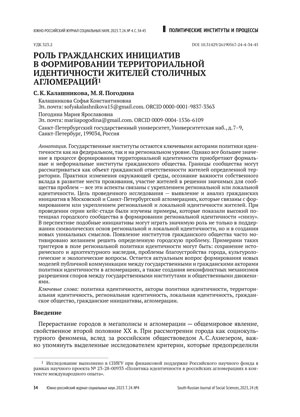Abstract
State institutions remain key actors in identity politics at both federal and regional levels. Nevertheless, both formal and informal institutions of civil society are becoming increasingly significant in the process of territorial identity formation. The concept of community boundaries can be regarded as a matter of civic responsibility for the inhabitants of a specific territory. The practices of environmental change, awareness of the importance of one’s own contribution to the development of the place of residence, and participation of residents in solving problems significant for the community are all related to the strengthening of regional or local identity. The objective of this study is to identify and analyze civic initiatives in the Moscow and St. Petersburg agglomerations that are related to the formation or strengthening of regional and local identity among residents. A series of case studies was conducted to examine instances where the urban community demonstrated a high capacity to influence regional identity from a grassroots level. In the future, such initiatives can play an important role not only in preserving the symbolic foundations of regional and local identity, but also in creating new, unique meanings. The establishment of civil society institutions is frequently driven by the intention to address a specific urban issue. Examples of such triggers in the field of regional identity politics can be found in the preservation of historical and architectural heritage, the resolution of problems associated with urban improvement, and the resolution of cultural and environmental issues. The issue of developing new models of public communication between the state and civil actors engaged in identity politics in agglomerations, as well as creating non-conflict mechanisms for resolving disputes between state institutions and social movements, remains pertinent.
Keywords
Acknowledgements
The study was conducted at St. Petersburg State University with financial support from the Russian Science Foundation under the research project N 23–28–00933, entitled “Identity Politics in Russian Agglomerations in the Context of International Experience”.
References
- Akhiezer, A. S. Gorod kak fokus urbanizatsionnogo protsessa. Gorod kak sotsiokul’turnoe yavlenie istoricheskogo protsessa [The City as a Focus of Urbanization Process. The City as a Socio-Cultural Phenomenon of the Historical Process]. M.: Nauka.
- Hamann U., Türkmen C. (2020). Communities of Struggle: The Making of a Protest Movement around Housing, Migration and Racism beyond Identity Politics in Berlin. Territory, Politics, Governance, 4, 515–531.
- Kol’ba, A. I., Tereshina, M. V. (2021). Problemy i politiko-administrativnye resursy razvitiya Krasnodarskoy gorodskoy aglomeratsii: k itogam issledovaniya [Problems and Political and Administrative Resources for the Development of the Krasnodar Urban Aglomeration: Results of Research]. Yuzhno-rossiyskiy zhurnal sotsial’nykh nauk [South-Russian Journal of Social Sciences], 3, 19–31. DOI: 10.31429/26190567-22-3-19-31
- Lachininskiy, S. S., Sorokin, I. S. (2021). Prostranstvennaya struktura i osobennosti razvitiya poseleniy Sankt-Peterburgskoy aglomeratsii [Spatial Structure and Development of Settlements in The Saint Petersburg Agglomeration]. Baltiyskiy Region [Baltic Region], 1, 48–69.
- Malinova, O. Yu. (2019). Politika pamyati kak oblast’ simvolicheskoy politiki [Politics of Memory as A Branch of Symbolic Politics]. METOD [METHOD], 9, 285–312.
- Lidström, A. (2015). Territorial Political Orientations in Swedish City–regions. Journal of Urban Affairs, 1, 31–46.
- Lidström, A., Schaap, L. (2018). The Citizen in City-regions: Patterns and Variations. Journal of Urban Affairs, 1, 1–12.
- Makhrova, A. G. (2014). Osobennosti stadial’nogo razvitiya Moskovskoy aglomeratsii [Specific Features of Stadial Development of The Moscow Agglomeration]. Vestnik Moskovskogo universiteta. Seriya 5, Geografiya [Lomonosov Geography Journal], 4, 10–16.
- Miroshnichenko, I. V., Morozova Ye. V. (2022). Publichnaya politika kak prostranstvo konvertatsii nematerial’nykh resursov v faktory razvitiya territoriy [Public Policy as a Space for Converting Intangible Resources into Factors of Territorial Development]. Politicheskaya nauka [Political Science], 3, 144–163.
- Morozova, Ye. V., Miroshnichenko, I. V., Semenenko, I. S. (2020). Razvitiye sel’skikh mestnykh soobshchestv: potentsial politiki identichnosti [Identity Policies in Rural Local Community Development in Russia]. Polis. Politicheskiye issledovaniya [Polis. Political Studies], 3, 56–77.
- Panchenkov, O. V., Voronkova, L. V. (2021). “Novyy gorodskoy aktivizm” i “publichnaya politika” v Rossii (na primere Sankt-Peterburga) [New Urban Activism’ and ‘Public Policy’in Russia (Case of Saint Petersburg)]. Zhurnal issledovaniy sotsial’noy politiki [Journal of Social Policy Research], 19(2), 253–268.
- Park, R. E. (1928). Human Migration and the Marginal Man. The American Journal of Sociology, 33(6), 881–893.
- Peters, B. G. (1999). Politicheskie instituty: vchera i segodnya. Politicheskaya nauka: novye napravleniya [Political institutions: yesterday and today. Political Science: New Directions]. Moskva: Institut “Otkrytoe obshchestvo”.
- Soldatova, A. S., Semushenkova, A. S. (2020). Osobennosti konstruirovaniya urovney identichnosti v proyektnoy deyatel’nosti rossiyskikh nekommercheskikh organizatsiy [The Specificity of Identity Formation in Project Activities of Russian Non-Profit Organizations]. Ars Administrandi [Ars Administrandi], 2, 176–202.
- Vaslavskiy, Ya. I. (2016). Neoinstitutsional’nyy podkhod kak metodologicheskaya osnova issledovaniya elektronnogo pravitel’stva [Neo-Institutional Approach to The Study of Electronic Government]. Vestnik MGIMO [MGIMO Review of International Relations], 6(51), 60–76.
 Русский
Русский


